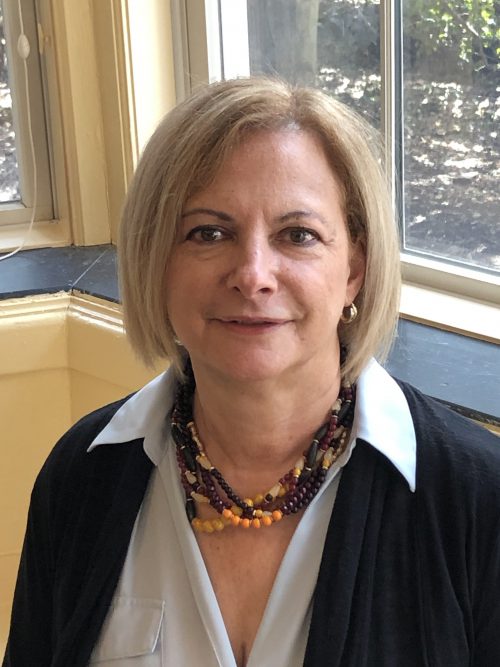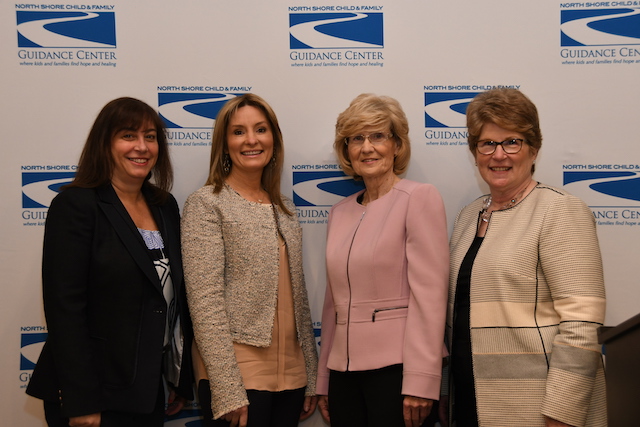
by North Shore Child & Family Guidance Center | Mar 26, 2019 | Blog
Does your child beg you for the latest version of the iPhone, or the hottest videogame, or even an outrageously priced handbag from the latest designer?
“Our kids are growing up in a world where what you have is sometimes seen as more important than who you are,” says Andrew Malekoff, Executive Director of North Shore Child & Family Guidance Center. “It’s the job of parents and other role models to teach children what truly matters: things like their ability to be kind, respectful, grateful and adventurous.”
What are parents up against in their quest to make their kids have a deep sense of self-worth because of who they are and how they treat people rather than because of what they own? The onslaught of advertising is quite a formidable opponent in trying to battle consumerism. According to The Nielsen Company, kids ages 2-5 spend more than 32 hours a week in front of the TV screen, while 6-11 year olds spend about 28 hours a week. And those statistics don’t factor in time spent on computers or smart phones or other media platforms.
“Child advertising may impact self-esteem, making kids feel inferior to their peers if they do not have the latest products seen in commercials,” says Malekoff.
But there is some good news for those who are disgusted by the overload and the manipulative nature of the ads that try to turn our kids into voracious consumers. According to the Campaign for a Commercial-Free Childhood (CCFC), Senators Ed Markey and Josh Hawley have recently proposed the strongest restrictions on marketing to children in more than two decades. Their bill, which we was designed with the CCFC’s help, would:
- Ban all targeted marketing to children under 13. That means advertisers can’t use kids’ locations, interests, browsing habits or anything else about them to target them with ads.
- Hold companies like YouTube, Instagram and Snapchat accountable for profiting off of the millions of underage children that regularly use their sites.
- Give teens important new privacy protections.
- Create a kid-focused division at the Federal Trade Commission to enforce these new rules.
In addition to voicing your support for this bill, you can follow some of CCFC’s suggestions on how to reclaim childhood from corporate marketers:
- Carve out commercial-free time. Make creative and outdoor play the norm. Have family nights for games, projects and other fun.
- Limit screen time. Pediatricians recommend: A. NO screen time for kids under two; B. Time limits for older kids; C. Keep bedrooms screen free.
- Reclaim your school. Work with friends and educators to limit (or eliminate) advertising in your community’s schools.
- Call out the worst corporate offenders on social networks and blogs. Share commercial-free alternatives.
- Learn more. Hold discussion groups, film viewings and book groups at your school, library or place of worship.
- Choose commercial-free. Buy toys, food and clothing from companies that do not market directly to children. Avoid companies that do.
As Malekoff says, “When you’re deciding how to spend your money, think about giving your children richness of experiences instead of a wealth of stuff. Most of all, give them your time and attention. They will value that more than anything they can buy in a store.”
Sources:
https://commercialfreechildhood.org/blog/its-happening-new-bill-will-ban-targeted-marketing-kids-online
https://commercialfreechildhood.org/resource/ten-things-you-can-do-reclaim-childhood-corporate-marketers
https://www.nielsen.com/us/en/insights/news/2009/tv-viewing-among-kids-at-an-eight-year-high.html

by North Shore Child & Family Guidance Center | Mar 22, 2019 | Blog
At North Shore Child & Family Guidance Center, our staff includes some amazing social workers who give their all to help children and teens who are suffering from a host of mental health challenges. Their goal is to move them from hurting to healing.
That mission is a heartfelt one for Elissa Smilowitz, a senior staff member who started at the Guidance Center in 2001. Her first role was as a psychiatric social worker at our middle school Intensive Support Program (ISP), one of the three Nassau B.O.C.E.S. schools where we provide extensive mental health services to students having difficulties succeeding in a typical school environment.
“In the ISP, the children and teens have a significant history of psychiatric and behavioral difficulties,” says Smilowitz. “A lot of the work involves educating parents regarding the needs of their children and validating the struggles they have trying to work with their home school districts to get the accommodations their kids require.”
Smilowitz flourished in that role, and in her sixth year was asked to become the coordinator of the Guidance Center’s high school ISP at Nassau B.O.C.E.S. in Wantagh. “All three of the Guidance Center’s ISP programs take a wrap-around approach, working with the family, the school, psychiatrists and case management services to help these children and teens succeed,” she says. “It really does take a village.”
She adds, “We strongly encourage the parents that the goal of ISP is to have their children become independent. Parents and kids feel very supported by this program, and that’s very rare.”
For all kids, no matter their age, she adds, the most important thing is to focus on making them feel accepted and loved for who they are. “So many of them have been labeled as ‘problems’ for so long that they view themselves through that negative lens,” she says. “In ISP, we work with them, along with their families, so they stop identifying themselves by their challenges and instead feel proud of their strengths. They learn the academic and emotional skills needed to go to college or thrive on whatever path they choose.”
After a total of 11 years with the ISP, Smilowitz began working at our main headquarters as the Coordinator of Triage and Emergency Services. In this critical role, she heads up a team that responds rapidly to help children who are in need of immediate, intensive outpatient care due to their at-risk behaviors.
“Many of the adolescents in this program are in danger of suicide and self-harm, and they have a significant decline in their everyday functioning,” she says. “The goals of the program are to encourage them to learn healthy coping skills, stabilize their mood and decrease the need for emergency room visits or in-patient hospitalizations. It’s a team approach of outpatient services that you don’t get anywhere else.”
A Mother’s Passion
Smilowitz didn’t start her career planning to be a social worker. For 30 years, she worked with her husband in the hardware business that they owned. But even during that time, as a young mother the seeds of her future career took hold.
“When my kids were younger, they had learning disabilities,” Smilowitz says. “Even though my son aced his tests, homework was difficult for him.”
Her son was found to have a motor skills disability, which impacted his academic ability—and his self-esteem. “Back then everything was writing, not typing on a keyboard,” she says. “Once his issues were clear, he got accommodations that helped him move from failing to getting ‘A’s in school.”
The problem was rooted in genetic issues, she explains, and her other son and daughter had similar issues. She learned how to advocate for their needs—and she took that knowledge and began volunteering to attend special education meetings with other parents who were new to the process.
“I wanted all kids to get the help they needed to feel better about themselves,” she says. “Parents don’t always know what kind of services their children are entitled to, and I felt it was my calling to help other parents understand the system.”
Once her son went to college, Smilowitz decided to go back to school to get her Masters in social work—and that decision has not only given her a career that she loves, but given many children and families the kind of support that can change lives.
The mission of the Guidance Center is one that Smilowitz embraces. “Working in such a holistic way is very aligned with my beliefs and my desire to help children and families improve their lives and destinies. I’m so proud of the work of the Guidance Center.”

by North Shore Child & Family Guidance Center | Mar 21, 2019 | In The Media

Are you ready for a fun-filled day of shopping, delicious dining and your favorite games? Then mark your calendars for North Shore Child & Family Guidance Center’s eagerly anticipated annual spring luncheon.
This year’s event will be held at the Glen Head Country Club on Wednesday, April 17 from 10 a.m. to 2 p.m. The Clubhouse, which includes a beautiful ballroom, cozy living room area and spacious card room, is the perfect setting for a fun-filled afternoon.

For those who love to play, the day will open with mahjong, canasta and bridge. Or, if those popular games are not your cup of tea, you can jump right in and start shopping at the unique boutiques, which will feature items from some of Long Island’s trendiest and most charitable small business owners, including Buy the Bag, Club & Country, Dash, I Thrive, Transitions and RFC Fine, among others. The jewelry and apparel are always favorites, but just as chic are the fashionable purses, accessories and housewares. There will also be plenty of opportunities to participate in raffles for luxury prizes, including a $500 gift certificate to Americana Manhasset.
The event will include a gourmet luncheon featuring the talents of Glen Head Country Club’s master chef.
Registration is now open and sponsorships are available by visiting the Guidance Center’s website, www.northshorechildguidance.org, or calling 516-626-1971, ext. 309.

by North Shore Child & Family Guidance Center | Mar 21, 2019 | In The Media

Every media outlet from Twitter and Facebook to CNN and the New York Times is abuzz with the latest scoop on the college admissions cheating scam.
It’s not surprising that a scandal of this magnitude is big news, but when you add in the fact that well-known celebrities have participated and have even been arrested — well, it’s no wonder that the media and the public are less focused on possible cuts to social security than on this latest frenzy.
Most stories have concentrated on how wealthy parents from Hollywood and beyond used their money and power to have admission tests taken on behalf of their children.
These parents also used an intermediary who created a fake charity to bribe college coaches and other school officials so their kids could apply to schools as recruited athletes, despite the fact that they had little or no athletic ability.
In short, corrupt means were used by parents to gain college admittance to select schools, including some of the most competitive in the nation.
While the stories are largely focused on the parents — especially the famous ones — little has been said about how their actions impact their offspring.
As someone who has spent his entire career working with children and their families, I’m left to wonder: Is there redemption for the student beneficiaries of their parents’ nefarious actions?
It has been presumed, in most if not all cases, that the students were unaware that their parents made payoffs to the schools.
Regardless, there are profound implications for the students that might include them wondering if they have disappointed their parents or failed to live up to their expectations.
I have always been a firm believer that all young people on their path to adulthood are faced with two burning questions: “Will I ever fit in?” and “Will I ever be any good at anything?”
The first question suggests the need for belonging and the second the need for mastery.
Psychiatrist and author Victor Frankl, a Holocaust survivor, spoke about individuals having “the means to live, but no meaning to live for.”
What meaning will the young people that were dishonestly admitted into leading colleges have to live for as the truth really sinks in? How long before a Twitter-storm buries them as they come face-to-face with the reality that everyone belongs on campus but them?
According to Frankl, meaning can be found by being authentic in your interactions with others; giving something back to the world; and changing one’s attitude when faced with a circumstance that you cannot change.
Beyond the bullying of electronic finger pointing, for the young people who were the recipients of the parents’ corrupt largesse, where do they go from here? And, why should we care about them?
I believe we should care because there are lessons to be learned for any child that uncovers and discovers family secrets that leave them wondering what is real in one’s life.
I am going to take a leap to say that the students who gained false admittance to colleges will become demoralized as reality sinks in. Demoralization may include feelings of hopelessness and worthlessness, as well as a sense of alienation and inability to cope.
These kids will need help in developing a reality-based sense of mastery consistent with some experiences of success in the real world.
Rather than seeing them as only privileged and spoiled rich kids, we should root for them to transcend this adversity, which is admittedly not the same as child growing up amid poverty and violence.
Still, we should pull for their lives to find a new and better trajectory than might have emerged from the corrupt actions of their parents.
We all benefit from all our kids’ success.
Andrew Malekoff is the Executive Director of North Shore Child & Family Guidance Center, which provides comprehensive mental health services for children from birth through 24 and their families. To find out more, call (516) 626-1971 or visit www.northshorechildguidance.org.
by North Shore Child & Family Guidance Center | Mar 18, 2019 | Press Releases
Event will feature Mahjong, Canasta, Bridge, great shopping and more
Roslyn Heights, NY, March 18, 2019 — Are you ready for a fun-filled day of shopping, delicious dining and your
favorite games? Then mark your calendars for North Shore Child & Family Guidance Center’s eagerly
anticipated annual Spring Luncheon!
This year’s event will be held at the elegant Glen Head Country Club on Wednesday, April 17 th from 10 a.m.
to 2 p.m. The Clubhouse, which includes a beautiful ballroom, cozy living room area and spacious card room,
is the perfect setting for a fun-filled afternoon.
For those who love to play, the day will open with Mahjong, Canasta and Bridge. Or, if those popular games
are not your cup of tea, you can jump right in and start shopping at the unique boutiques, which will feature
items from some of Long Island’s trendiest and most charitable small business owners, including Buy the Bag,
Club & Country, Dash, I Thrive, Transitions and RFC Fine, among others. The jewelry and apparel are always
favorites, but just as chic are the fashionable purses, accessories and housewares. There will also be plenty of
opportunities to participate in raffles for luxury prizes, including a $500 gift certificate to Americana
Manhasset.
The event will include a fabulous gourmet luncheon featuring the talents of Glen Head Country Club’s master
chef.
Registration is now open and sponsorships are available by visiting the Guidance Center’s website,
www.northshorechildguidance.org or calling 516-626-1971, ext. 309.
About Us:
As the preeminent not-for-profit children’s mental health agency on Long Island, North Shore Child & Family
Guidance Center is dedicated to restoring and strengthening the emotional well-being of children (from birth –
age 24) and their families. Our highly trained staff of psychiatrists, psychologists, social workers, vocational
rehabilitation counselors and other mental health professionals lead the way in diagnosis, treatment,
prevention, training, parent education, research and advocacy. The Guidance Center helps children and
families address issues such as depression and anxiety; developmental delays; bullying; teen pregnancy; sexual
abuse; teen drug and alcohol abuse; and family crises stemming from illness, death, trauma and divorce. For
more than 65 years, the Guidance Center has been a place of hope and healing, providing innovative and
compassionate treatment to all who enter our doors, regardless of their ability to pay. For more information
about the Guidance Center, visit www.northshorechildguidance.org or call (516) 626-1971.





